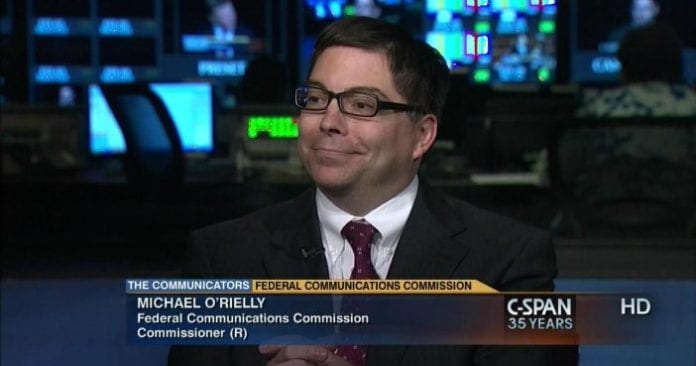Says FCC support of municipal infrastructure is “borderline socialism”
FCC Commissioner Michael O’Rielly recently spoke to the Prosperity Caucus, a DC-based organization founded in 1986 by Regan-era Republicans, about how the regulatory agency lacks economic pragmatism.
During the Commissioner’s remarks in what is encouraged to be a informal atmosphere he said the Federal Communication Commission has a “dearth of economists at the Commission” noting that, “The fact of the matter is that we have a lot more lawyers than economists.”
O’Rielly lambasted the FCC’s recent approach to fulfilling its regulatory obligation while championing the free market and private enterprise.
“In our system of free enterprise, we hold the belief that consumers and businesses should be able to freely buy and sell, without needing the permission of the government, and with minimal restrictions placed on business activities or asset ownership. And although these days it may seem as though profit is a being treated as a bad word, know that for me I see profit, not as harmful, but as a shorthand for employer, dividend payer, taxpayer, community participant and many other things. Policymakers in Washington D.C. should be constantly on guard against unnecessary restrictions that interfere with the freedoms of any willing buyer or seller in our economy, because we have no idea what types of products or services our regulations may discourage from coming to market.”
O’Rielly outlined how he would change the FCC approach to regulation.
- “First, the Commission must consider whether it has the authority to regulate, as well as realizing the confines of that authority.
- “Second, the Commission must have verifiable and specific evidence that there is a market failure before acting.”
- “Third, when the Commission does intervene, its solution should be carefully tailored and apply only to the relevant set of providers or services.”
- “Fourth, the benefit of regulation must outweigh the burdens. Even when rules are grounded in the statute, based on evidence, address a real harm, and target a specific problem, there are still costs to intervening, and we must consider those costs as part of our analysis.”

